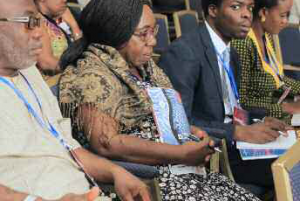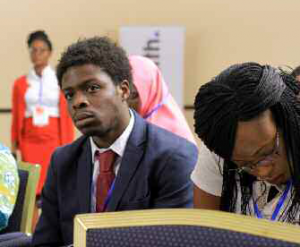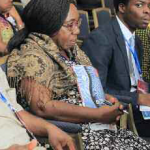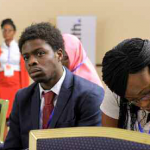I was privileged to be given the opportunity to pursue a seven-week medical elective in Nigeria between April and June of this year. Touching down at Murtala Muhammed Airport, I witnessed the unique hustle and bustle of the Lagos environment, the intense heat and the army of motorists (some of which might draw more than a raised eyebrow from British police officers!).
This introduction was only to be the beginning of the culture shock I received on visiting the country of my birth for the first time as an adult. Having said this, I enjoyed my stay in Nigeria. One can come to appreciate the beauty in this country, both visually and culturally. I do not wish to punch holes in the establishment (there is no such thing as a perfect system after all) but merely aim to reflect upon my experience in the hope that my
thoughts and observations may contribute towards the ongoing discussion on health and social care issues in Nigeria’s fledgling but rapidly evolving healthcare sector.
The financial model –can we all afford our basic right to healthcare?
The first difference I had to wrap my head around was the financial model. In the UK, a high tax both on income and spending has meant that healthcare is received ‘free’ at the point of need. There is the option of private
health insurance to bypass queues or see a preferred physician – convenience or cosmetic procedures also tend not to be free. However, everyone in the UK has access to everything from a routine health check-up to critical care
and life-saving treatment.
By contrast in Nigeria, most treatment is financed by the patient. While this means the burden of health care falls less on government, it does assume that Nigerians can afford the cost of healthcare, and this can be quite
considerable! One figure I heard quoted was in the region of 120,000 Naira for three days of admission with no interventions.
Companies usefully offer health insurance packages to employees, but are these benefits available to everyone? Nearly 20% are unemployed. Does this mean they do not deserve healthcare? Many would argue that adequate healthcare provision is a human right despite financial worth. Ultimately since the burden is not shared amongst the entire
population through a government-initiated scheme, there is an inevitable socioeconomic imbalance to healthcare access in Nigeria.
I was extremely troubled during this placement, to witness a child patient being refused access to the Emergency Room (ER) at a government hospital despite being in need of medical attention at the time. The child in question was eventually granted access only after the parents had managed to gather the required sum of cash to pay the fees.
It would only be fair to mention at this point that Nigeria is in the process of implementing a National Health Insurance Scheme (NHIS) for all its citizens. Although its existence represents an indication of quite dedicated political will in this area, the Scheme is fraught with early difficulties and precisely how effective it will be in the long run, only time will tell.
The service provider model – hospitals vs healthcare trusts
A common trend noticeable in both private and public sector healthcare practice in Nigeria is that most hospital establishments attempt to provide every amenity (and service) necessary to cope with every possible demand or requirement a patient may have. The rationale behind this approach no doubt is to encourage the patient to patronise the hospital’s services as a ‘one-stop-shop’ for all things medical.
However, this approach is often met with the problem of a lack of much-needed funding to run and maintain such facilities. The problem is particularly evident in government-run hospitals which as expected, do not have the
additional benefit of private sector investment funding. The inevitable consequence is that shortcuts are taken, which go on to compromise the quality and safety of care rendered by these establishments.
In many instances, facilities (or entire hospitals in some cases) are shut down due to poor maintenance. At present, there are very few government hospitals with working CT scanners, due mainly to the initial and ongoing
costs of maintaining expensive infrastructure across multiple units and specialities.
A system of healthcare ‘trusts’, is an aspect of UK healthcare delivery that I have often taken for granted. Healthcare centres across the country are split into deaneries with responsibility over regions. For example, the
North West England deanery provides coverage for much of the north west of England. Within these deaneries, healthcare provision resources are divided and organised into trusts.
This system of organised healthcare distribution ensures that within trusts and deaneries, all services dedicated to a region are not concentrated entirely in one hospital. For example, one hospital in the trust might happen to be a tertiary centre for cardiology while another might be a tertiary centre for renal medicine. If a patient who happens to be in a particular centre now requires tertiary expertise that is held in a different hospital within the same trust, they are simply referred and transferred to that hospital for treatment.
The result is that budgets are well organised and allocated within the trust, and less funding goes to staffing and supplying all hospitals with all the amenities for multiple tertiary centres when this can be divided up
within trusts and deaneries. It also offers the added advantage that there is not necessarily a single ‘centre of excellence’ for all things but rather, a healthy spread of healthcare professionals and resources across the various units within a region.
Although it is often inconvenient to travel to get a specific service elsewhere, introducing a system of devolved responsibility has encouraged cost-effectiveness in service delivery while enabling a focus on specialised,reliable care.
Multidisciplinary approaches
Doctors are held in high regard in Nigeria. While I encountered many good examples of patientcentred care, I also observed that patients are more inclined to invest a great deal of trust and belief in their doctor.

While this is amazing and interesting to observe, I foresee problems arising in situations where other healthcare professionals are professionally better suited to address the needs of the patient. The ethos of a
multidisciplinary team (MDT) is that all the professionals involved in the treatment of a patient are valued in their own right and have their role to play.
A good example would be in the field of obstetrics, in which it is generally considered good practice that unless the mother or foetus have known health concerns (or complications), delivery of the infant is midwifeled
(assuming the existence of a suitably qualified midwife). The obstetrician’s role in the case is altered to one of managing any medical or surgical problems that may arise during the pregnancy.
Culture & religion –friend or foe?
Religion has a significant role to play in healthcare delivery. During consultations, I would regularly hear patients express their faith and trust in God as an integral part of the process. Unfortunately, religion in my view can become intrusive in some cases.
One example of this was a patient whose family admitted to taking their child to church for prayers rather than have them admitted to the nearest hospital.
The situation remained the same for several years until they eventually succumbed and presented at the hospital years later.
In another case, a mother explained that she was close to giving up hope and contemplating taking her child to the church instead of pursuing tertiary care in the hospital. It is well recognised that patients do have
spiritual and religious needs during this challenging period in their lives for a variety of reasons. In the UK, chaplains are regularly invited onto the ward and encouraged to attend (on request) to patients’ spiritual needs,
obviating the need to self-discharge to attend church.
Religion also potentially becomes an obstacle in matters relating to terminal conditions and palliative care. Almost routine in UK hospitals is the concept of ‘Do Not Attempt Cardiopulmonary Resuscitation’ (DNACPR)
orders. When a patient is diagnosed with a terminal illness, Cardiopulmonary resuscitation (CPR) is generally not attempted as it is deemed futile in these cases, often undermines the dignity of the patient and serves only to
cause further distress to all concerned.
As a believer, it is my opinion that spirituality does have a significant role to play in healthcare delivery and can even be incorporated to form a part of the treatment process. As previously mentioned, I have observed chaplains provide this function in the UK by fulfilling patient’s spiritual needs auxiliary to primary treatment.
In most modern religions, death is unavoidable and merely the gateway to the next life. Surely, an aspect of healthcare provision is ensuring that this process of transition is as comfortable as possible for the patient and their loved ones. I believe this to be an essential part of the basis on which a multidisciplinary team (MDT) involvement in palliative care treatment is offered.
Maintaining national minimum health standards
One of my other thoughts during the elective in Nigeria was that countries such as the UK could maintain such high standards of healthcare primarily due to periodic audits conducted by students and staff. Government
organisations such as the Care Quality Commission (CQC) regularly inspect healthcare provision centres and ensure minimum standards are met prior to re-accreditation.

A unit that fails to meet these standards may be heavily sanctioned, often in the form of a fine or introduction of guidelines and ‘special measures’ that ensure the failure is remedied and does not occur in future. This system not only provides an incentive for the country to maintain health standards but also allows individual units to take pride in their own achievements and engage in healthy competition with other units, hospitals and trusts.
A system of healthcare ‘trusts’ is an aspect of UK healthcare delivery that I have often taken for granted.
Although I observed during my elective that there is a practice among some private hospitals to seek accreditation through inspection by external bodies every 3 (or more) years, I also observed that these inspections
are generally conducted by private (albeit international) organisations, strictly by invitation.
I did not notice any national body that regularly audited hospitals in order to assess standards.
Closing thoughts
I must stress that my time in Nigeria was both enjoyable and hugely insightful. I was made to feel very welcome by all during my seven-week stay in the country. I witnessed on several occasions, staff demonstrating a passion for providing the best medical care possible, correctly following guidelines and standards despite the odds. Chatting with them, I learnt many lessons of staff experiencing delays in salary and enduring unsociable working hours – a situation with many inherent implications of its own!
It is evident that health professionals in Nigeria are extremely passionate about seeing a positive change made to healthcare provision across the country. This attitude could not have been more evident than when I was given the opportunity to attend the BeyHealth Masterclass Conference on Oncology and Cancer Care, much of which has motivated the writing of this article.
I am extremely hopeful of witnessing significant growth and progress in the Nigerian health sector in the years to come. As I also return to the UK to begin my journey as a practising clinician, I am keenly aware of the
value of this experience in providing for me, an extremely useful window into the responsibilities and challenges of healthcare provision in the developing world.
Disclosure forms provided by the author are available at NEJM.org.
Editor’s note:
Author Affiliations
Abimbola Aluko ,graduated from Imperial College School of Medicine in 2018 and now works as a junior doctor (FY1) at Blackpool Victoria Hospital, UK.
Supplementary Material
| Disclosure Forms | 83KB |
Add your Comment
Add your Comment
Leave a Reply
You must be logged in to post a comment.
BHQJ 2018 ; 001:34-36
Related Article 
Medical Negligence & the Law5th May 2018 . Atrogenic harm is a matter of significant concern in Nigeria admin
Colorectal Cancer Overview5th May 2018 . [dkpdf-columns columns="3" equal-columns="false" gap="10"] Introduction Colorectal cancer is a major admin
Funding Healthcare Services in Nigeria – A conundrum of demand, policy and supply!5th May 2018 . [dkpdf-columns columns="3" equal-columns="false" gap="10"] Doctor, I happy say na you admin
5 “Provocations” of Healthcare Quality Reform6th May 2018 . [dkpdf-columns columns="3" equal-columns="false" gap="10"] n the four decades since he admin
Health Insurance, Activism & Urgent Change6th May 2018 . [dkpdf-columns columns="3" equal-columns="false" gap="10"] AR: Dr Soyinka, it’s wonderful to admin
Anne Olowu talks about her “Masterclass” experience6th May 2018 . [dkpdf-columns columns="3" equal-columns="false" gap="10"] As I suspect is the case admin
Stomach & Oesophageal Cancer in Nigeria6th May 2018 . [dkpdf-columns columns="3" equal-columns="false" gap="10"] Gastric and Oesophageal (Upper GI) cancers admin
Setting out the Stall!7th May 2018 . [dkpdf-columns columns="3" equal-columns="false" gap="10"] "The drawbacks of our false knowledge admin




Leave a Reply
You must be logged in to post a comment.